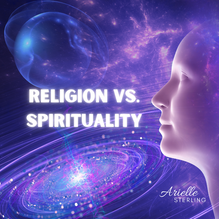 In the realm of human experience, religion and spirituality often intertwine, yet they represent distinct concepts that profoundly shape individuals' beliefs and practices. While these terms are sometimes used interchangeably, it's essential to recognize their unique characteristics and understand why they are different. ReligionIn its traditional sense, religion refers to organized systems of beliefs, practices, rituals, and moral codes typically rooted in doctrines or sacred texts. It often involves institutions, clergy, and formalized structures guiding adherents' spiritual journey. Religions such as Christianity, Islam, Judaism, Hinduism, and Buddhism have shaped societies, cultures, and civilizations for centuries, providing frameworks for understanding the cosmos, human existence, morality, and the afterlife. SpiritualityOn the other hand, spirituality is a more personal and individualized concept, often focusing on inner experiences, personal growth, and a connection to something greater than oneself. While spirituality may intersect with religious beliefs, it is not bound by institutionalized doctrines or rituals. It encompasses a wide range of practices, that may include meditation, mindfulness, yoga, prayer, and contemplation, which aim to cultivate a deeper understanding of the self, the universe, and the divine. DifferencesOne of the fundamental differences between religion and spirituality lies in their approach to authority and dogma. Religion tends to rely on external authorities, such as scriptures, religious leaders, and institutions, to dictate beliefs and practices. Adherents are often expected to adhere to prescribed doctrines and rituals, with deviations sometimes met with skepticism or condemnation. In contrast, spirituality emphasizes individual autonomy and inner wisdom, encouraging seekers to explore their experiences and truths without rigid dogmas or hierarchical structures. Another distinction is the scope of their focus. Religion often encompasses a broader range of social, cultural, and ethical dimensions, providing guidelines for communal living, morality, and societal norms. It fosters a sense of belonging and identity within a specific religious community and often involves collective rituals and ceremonies. Spirituality, however, tends to be more inwardly focused, emphasizing personal transformation, inner peace, and transcendent experiences. It is less concerned with external rules or communal practices and more with individual growth and self-awareness. SimilaritiesDespite these differences, religion and spirituality share common ground in their quest for meaning, purpose, and transcendence. Both address existential questions about the nature of reality, the mystery of existence, and the human longing for connection and fulfillment. They provide:
Moreover, religion and spirituality are not mutually exclusive; many individuals integrate elements of both into their lives, drawing inspiration from religious traditions while also exploring their spiritual path. Some find spiritual fulfillment within the structures of organized religion, while others pursue a more eclectic or individualized approach outside of institutionalized faiths. While religion and spirituality are distinct concepts with different emphases and approaches, they both play vital roles in shaping human beliefs, values, and experiences. Understanding their differences can deepen our appreciation for how people seek meaning and connection. Whether one finds solace in the rituals of a religious community or discovers spiritual insights through personal practices, both paths offer opportunities for growth, understanding, and transcendence in life's journey.
0 Comments
Leave a Reply. |
Arielle SterlingArielle is a best-selling author, holistic life coach and intuitive energy healer. Archives
July 2024
Categories
All
|


 RSS Feed
RSS Feed